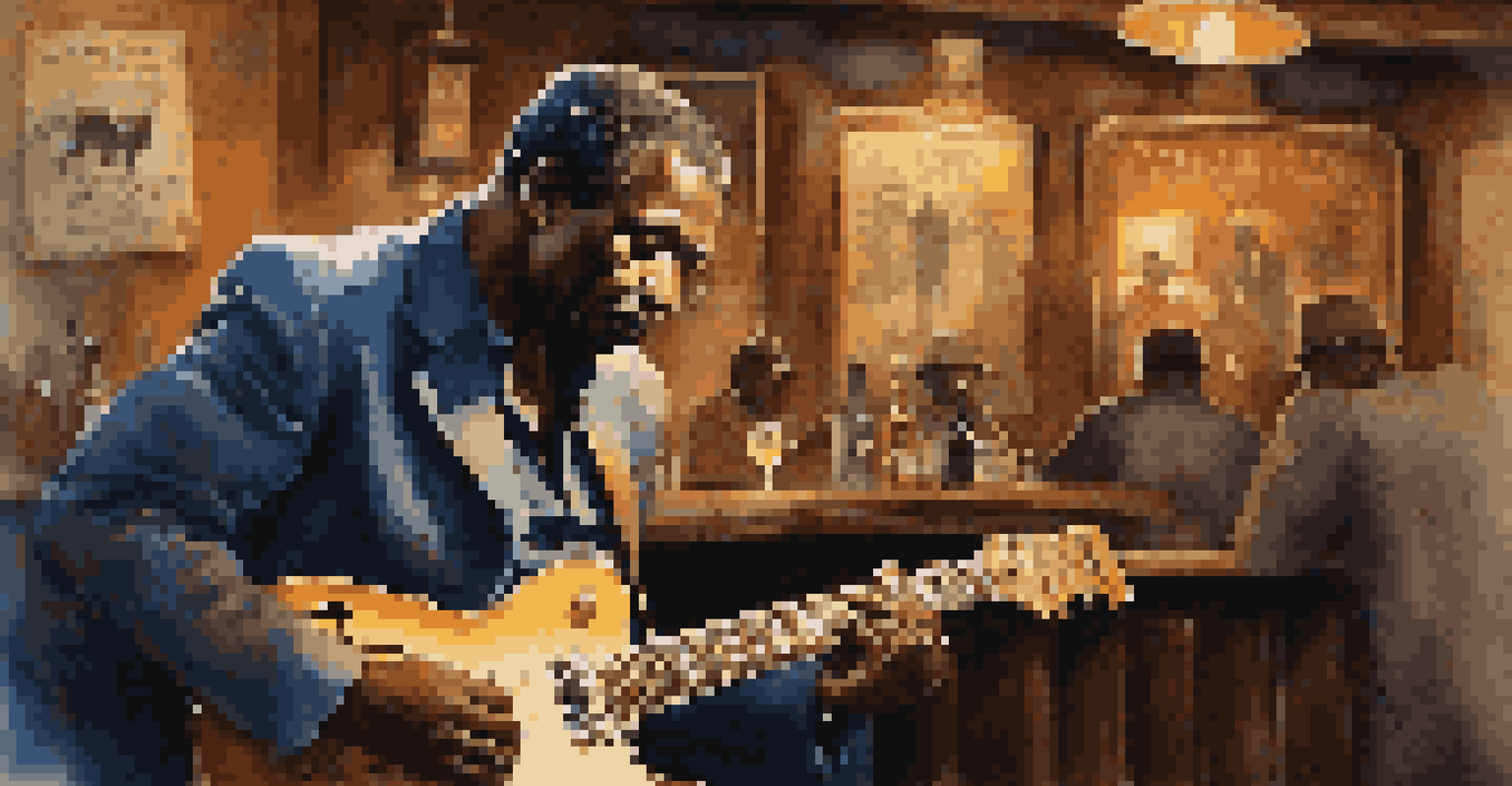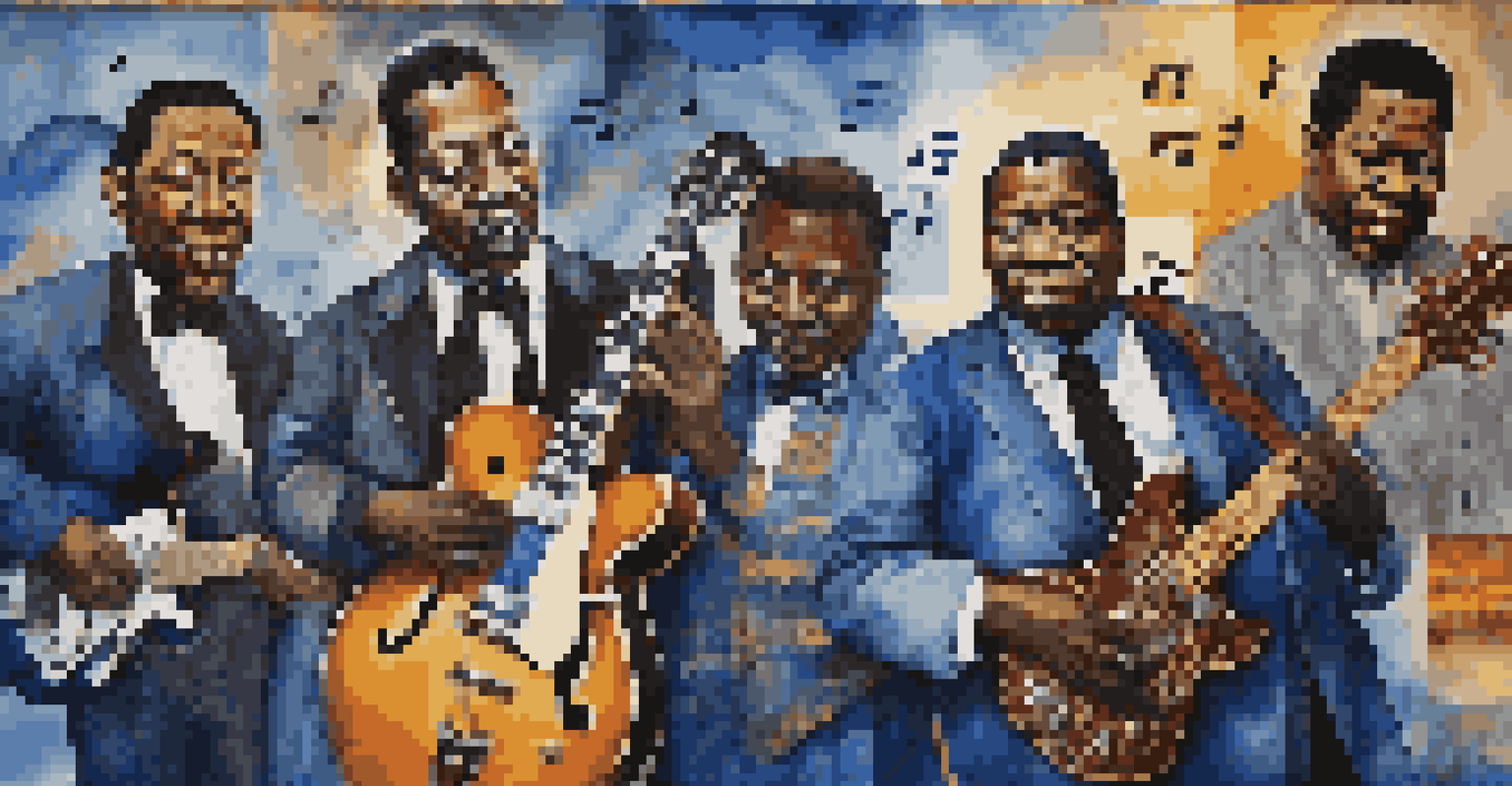The Influence of American Blues on Global Music Scenes

Understanding the Roots of American Blues
American blues originated in the Deep South during the late 19th century, rooted in African American history and culture. It emerged from the spirituals and work songs of African slaves, melding personal expression with rhythmic storytelling. This genre lays the groundwork for significant musical evolution, blending various influences that would later resonate globally.
The blues is a low down shakin' chillin' beat that can make you feel good even when you're sad.
Central to the blues is its emotional depth, often conveying themes of heartache, struggle, and resilience. Artists like B.B. King and Muddy Waters became iconic figures, their music reflecting not just personal narratives but also broader societal issues. The raw emotion found in blues struck a chord, creating a universal language that transcended geographical boundaries.
As blues expanded beyond its Southern origins, it began to incorporate elements from jazz, rock, and folk, enriching its sound. This fusion not only appealed to diverse audiences but also inspired musicians worldwide, paving the way for a cross-cultural exchange that would define future music scenes.
Blues' Influence on Rock and Roll
The explosion of rock and roll in the 1950s can be traced back to the foundational elements of blues music. Artists like Chuck Berry and Elvis Presley infused their rock sound with blues rhythms and techniques, creating a genre that captivated young audiences. This blend not only shaped American music but also had a ripple effect across the globe.

Rock and roll's rise gave birth to a new wave of musicians who idolized blues artists, incorporating their styles into their own work. Bands like The Rolling Stones and Led Zeppelin paid homage to blues legends, ensuring that the genre remained relevant in popular music. This lineage from blues to rock exemplifies how one style can evolve while paying respect to its roots.
As rock and roll spread internationally, so too did the influence of blues. Musicians in the UK, Australia, and beyond began to draw inspiration from American blues, leading to a rich tapestry of sounds that evolved in new directions while maintaining the essence of the original genre.
The Global Adaptation of Blues
As American blues traveled across borders, it adapted to various cultural contexts, resulting in unique regional interpretations. For instance, the emergence of 'blues rock' in the UK showcased a distinct style, characterized by a heavier sound and a fusion of British rock elements. This adaptation illustrates the genre's flexibility and its ability to resonate with diverse audiences.
Blues is a tonic for whatever ails you. I could play the blues and then not be blue anymore.
In Africa, artists began to incorporate blues into local musical traditions, creating styles such as 'Afro-blues' that merged indigenous rhythms with blues' emotive storytelling. This melding of genres highlights how blues can serve as a bridge, connecting cultures and fostering creativity. The result is a vibrant tapestry of music that honors its American origins while celebrating local influences.
Similarly, in Latin America, musicians have embraced blues, infusing it with elements of salsa, jazz, and folk music. This cross-pollination enriches the blues genre, creating a global dialogue among artists and audiences, and further demonstrating the universality of its themes.
The Role of Technology in Spreading Blues
In the digital age, technology has played a pivotal role in disseminating blues music worldwide. Streaming platforms, social media, and online communities have made it easier for artists to share their work and for fans to discover new sounds. This accessibility has helped revitalize interest in blues, ensuring its legacy continues for future generations.
Podcasts and online radio stations dedicated to blues music have emerged, curating playlists and educating listeners about the genre's history and its artists. These platforms create a space for dialogue and appreciation, allowing fans from different backgrounds to connect over shared musical interests. The global reach of technology enables a diverse audience to engage with blues in ways that were previously unimaginable.
Moreover, musicians can collaborate across continents, blending their styles to create innovative new genres. This interconnectedness not only keeps the spirit of blues alive but also propels it into new territories, enriching the global music landscape with fresh interpretations and sounds.
Blues Festivals: A Celebration of Culture
Blues festivals around the world serve as vibrant gatherings to celebrate the genre and its cultural significance. Events like the Chicago Blues Festival attract thousands of fans, showcasing both legendary artists and emerging talent. These festivals create a communal atmosphere, where audiences can appreciate the diverse expressions of blues music together.
International festivals in countries like France, Canada, and Japan highlight how blues has been embraced globally, featuring local artists alongside American legends. Such events facilitate cross-cultural exchange, allowing musicians to network and collaborate, ultimately enriching the genre further. The sense of community fostered at these festivals reinforces the idea that blues is not just music; it's a shared experience.
Additionally, blues festivals often include workshops and discussions, educating attendees about the genre's history and impact. This commitment to preserving and promoting blues culture ensures that its influence continues to thrive, inspiring new generations of musicians and fans alike.
The Future of Blues in a Global Context
As we look to the future, the evolution of blues is likely to continue in exciting and unpredictable ways. With the ongoing blending of genres and the rise of new technologies, artists are constantly finding fresh avenues to express themselves. This dynamic landscape suggests that blues will never be static; it will always adapt and grow.
Emerging artists from diverse backgrounds are incorporating blues elements into their music, ensuring that the genre remains relevant and accessible. This new wave of musicians might blend blues with hip-hop, electronic music, or world music, creating innovative sounds that resonate with younger audiences. The future of blues is as much about honoring its past as it is about exploring new frontiers.
Ultimately, the enduring influence of American blues on global music scenes speaks to its universal themes of struggle, love, and resilience. As long as these experiences exist, blues will continue to thrive, inspiring and connecting people across the globe through the power of music.
Conclusion: The Enduring Legacy of Blues Music
The influence of American blues on global music scenes is a testament to its rich history and cultural significance. From its humble beginnings in the Deep South to its worldwide adaptations, blues has proven to be a powerful force in music. Its ability to connect with people from various backgrounds speaks to the genre's universal themes and emotional depth.
As we celebrate the past and present of blues music, we must also acknowledge its future. The ongoing evolution of the genre ensures that it will continue to resonate with new generations, inspiring artists and fans alike. By embracing the diverse interpretations of blues around the world, we can appreciate the genre’s role in fostering cultural exchange and unity.

In essence, American blues is more than just a musical genre; it is a cultural phenomenon that transcends borders. Its legacy will live on, continually influencing and inspiring musicians and listeners, reminding us of the power of music to bring people together.